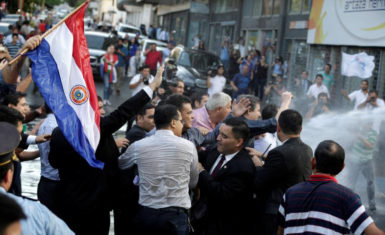ASUNCION (Reuters) – Protesters stormed and set fire to Paraguay’s Congress yesterday after the Senate secretly voted for a constitutional amendment that would allow President Horacio Cartes to run for re-election, a change that will also require approval by the House.
The country’s constitution has prohibited re-election since it was passed in 1992 after a brutal dictatorship fell in 1989. “A coup has been carried out. We will resist and we invite the people to resist with us,” said Senator Desiree Masi from the opposition Progressive Democratic Party.
Television images showed protesters breaking windows of the South American country’s Congress after several hours of escalating violence and confrontations with police.

Demonstrators burned tires and removed parts of the fences surrounding the Congress building, and police in riot gear responded by lobbing tear gas and firing rubber bullets.
Several politicians and journalists were injured, local media reported, and Interior Minister Tadeo Rojas said many police were hurt.
The number of casualties was unknown. Several people were inside Congress as the flames spread. Television images showed firefighters arriving on foot to fight the blaze.
The Senate voted earlier yesterday during a special session in a closed office in Congress rather than on the Senate floor. Twenty-five lawmakers voted for the measure, two more than the 23 required for passage in the 45-member upper chamber.
Opponents of the measure, who claim it would weaken Paraguay’s democratic institutions, said the vote was illegal.
The proposal goes to the House, where it appeared to have strong support. A vote expected to take place early today was called off until the situation calmed down, said the chamber’s President Hugo Velazquez. “I call for calm,” Velazquez said. “Tomorrow we will not take any decision; we will not hold a session.”
Several Latin American countries, including Paraguay, Peru and Chile, prevent presidents from running for consecutive terms in a region where the memories of military dictatorships remain ripe.
Others, including Colombia and Venezuela, have changed their constitutions to give sitting presidents a chance at re-election.
Paraguay’s measure would apply to future presidents and Cartes, a soft-drink and tobacco mogul elected to a five-year term in 2013. His strongest backers want him to be allowed to run for another term next year, but critics of the measure have said a constitutional change aimed at benefiting a sitting president would be unfair.
The change would also apply to former President Fernando Lugo, whose supporters want to be allowed to run for another term.
“Everything was done legally,” said Senator Carlos Filizzola of the leftist Guasu Front coalition, which supports the constitutional amendment as a way of allowing Lugo to return as Paraguay’s leader.




